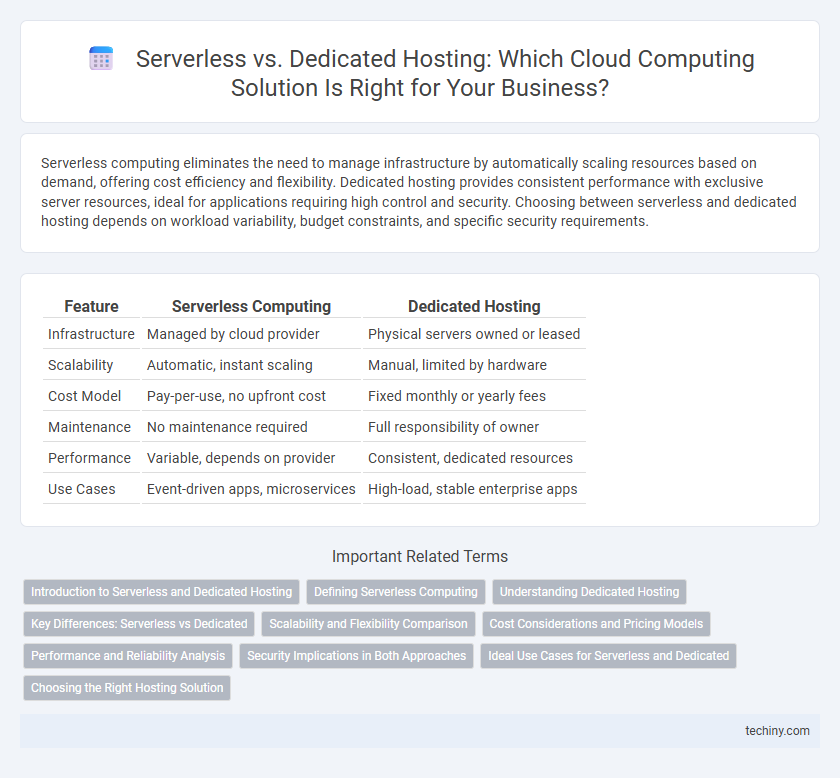Serverless computing eliminates the need to manage infrastructure by automatically scaling resources based on demand, offering cost efficiency and flexibility. Dedicated hosting provides consistent performance with exclusive server resources, ideal for applications requiring high control and security. Choosing between serverless and dedicated hosting depends on workload variability, budget constraints, and specific security requirements.
Table of Comparison
| Feature | Serverless Computing | Dedicated Hosting |
|---|---|---|
| Infrastructure | Managed by cloud provider | Physical servers owned or leased |
| Scalability | Automatic, instant scaling | Manual, limited by hardware |
| Cost Model | Pay-per-use, no upfront cost | Fixed monthly or yearly fees |
| Maintenance | No maintenance required | Full responsibility of owner |
| Performance | Variable, depends on provider | Consistent, dedicated resources |
| Use Cases | Event-driven apps, microservices | High-load, stable enterprise apps |
Introduction to Serverless and Dedicated Hosting
Serverless computing enables developers to build and run applications without managing underlying servers, offering automatic scaling and event-driven execution. Dedicated hosting involves leasing an entire physical server solely for one tenant, providing full control over hardware and software configurations. Both options cater to different needs: serverless optimizes for agility and cost-efficiency, while dedicated hosting ensures performance consistency and security.
Defining Serverless Computing
Serverless computing is a cloud execution model where the cloud provider automatically manages the infrastructure, enabling developers to run and scale applications without provisioning or maintaining physical servers. Unlike dedicated hosting, where resources are fixed and server management is manual, serverless resources dynamically allocate based on demand, optimizing cost and performance. This model supports event-driven architectures and microservices, allowing for increased agility and reduced operational overhead.
Understanding Dedicated Hosting
Dedicated hosting offers a physical server exclusively allocated to a single organization, ensuring maximum control over hardware configurations, security protocols, and performance optimization. This model eliminates resource contention common in shared environments, providing consistent bandwidth and low-latency communication for mission-critical applications. Businesses with predictable workloads and stringent compliance requirements often prefer dedicated servers for their reliability, customizable infrastructure, and enhanced data sovereignty.
Key Differences: Serverless vs Dedicated
Serverless computing dynamically allocates resources on demand, eliminating the need for server management and enabling automatic scaling, while dedicated hosting provides fixed, physical servers exclusively for one user, ensuring consistent performance and greater control. Serverless models typically offer cost efficiency by charging only for actual usage, whereas dedicated hosting involves a fixed cost regardless of resource consumption. Security in dedicated hosting is often more customizable due to isolated hardware, contrasting with the shared infrastructure approach in serverless environments.
Scalability and Flexibility Comparison
Serverless computing offers automatic scalability by adjusting resources dynamically based on workload demands, eliminating the need for manual intervention. Dedicated hosting provides fixed resources, which may require manual scaling and infrastructure upgrades to handle increased traffic. The flexibility of serverless architectures supports rapid deployment and cost efficiency, while dedicated hosting ensures consistent performance with more control over hardware configurations.
Cost Considerations and Pricing Models
Serverless computing eliminates the need for upfront infrastructure investment by charging based on actual usage, such as compute time and memory consumption, resulting in highly scalable and cost-efficient pricing models. Dedicated hosting involves fixed monthly or yearly fees regardless of resource utilization, which can lead to higher costs during periods of low traffic but offers predictable expenditure and full control over hardware resources. Evaluating workload patterns and scalability needs is essential to determine whether a pay-as-you-go serverless model or a stable-cost dedicated hosting plan provides better cost optimization.
Performance and Reliability Analysis
Serverless computing offers dynamic resource allocation, enhancing performance during variable workloads by scaling instantly without manual intervention, whereas dedicated hosting provides consistent resource availability with predictable performance under steady loads. In terms of reliability, serverless platforms reduce single points of failure through distributed infrastructure and automatic failover, while dedicated hosting relies heavily on hardware stability and necessitates proactive maintenance to prevent downtime. Evaluating application requirements for latency sensitivity and traffic patterns is critical, as serverless excels in burst scenarios and dedicated hosting guarantees steady high-performance for constant demand.
Security Implications in Both Approaches
Serverless architectures abstract server management, reducing the attack surface by limiting access to the underlying infrastructure, but they require strict function-level permissions and robust API security measures to prevent exploits in shared environments. Dedicated hosting offers greater control over security configurations, allowing customized firewall rules, intrusion detection systems, and isolated environments, which can be essential for compliance-sensitive applications. However, dedicated servers demand diligent maintenance and patch management to mitigate vulnerabilities, whereas serverless models benefit from automatic updates handled by providers, shifting the security responsibility balance.
Ideal Use Cases for Serverless and Dedicated
Serverless computing is ideal for applications with unpredictable or variable workloads, such as event-driven microservices, real-time data processing, and rapid prototyping, where automatic scaling and reduced operational management are crucial. Dedicated hosting suits business-critical applications requiring consistent performance, high security, and full control over hardware configurations, commonly found in industries like finance, healthcare, and enterprise resource planning (ERP) systems. Choosing between serverless and dedicated hosting depends on workload patterns, compliance requirements, and the need for infrastructure customization.
Choosing the Right Hosting Solution
Serverless hosting offers automatic scalability and cost efficiency by charging only for actual usage, making it ideal for unpredictable or variable workloads. Dedicated hosting provides consistent performance and greater control with fixed resources, suited for high-traffic or security-sensitive applications. Evaluating factors such as application demand, budget, control requirements, and scalability needs is crucial for selecting the appropriate hosting solution.
Serverless vs Dedicated Hosting Infographic

 techiny.com
techiny.com